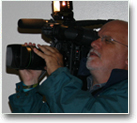
 |
  Trent University Receives Funding for Cutting-Edge Research on Goat GeneticsFOR IMMEDIATE RELEASE Potential outcomes are new export markets for Ontario dairy goat breeders and enhancing agricultural productivity in developing countries Monday January 28, 2013, Peterborough A team of Trent University researchers led by Dr. Bradley White, director of the Natural Resources DNA Profiling and Forensics Centre at Trent University, was successful in securing multi-partner grants totaling $100,000 to conduct primary research on the genetics of a high-performing breed of dairy goats. Dr. White’s team at Trent includes Dr. Linda Rutledge, Ph.D. graduate and post-doctoral student, and Dr. Lesley Kerr, associate professor of Biology. The lead funder for the research is the Centre of Excellence in Goat Research and Innovation (COEGRI) which provided a $50,000 grant to the research team. Other funders include the Canadian Livestock Genetics Association and a collaboration of regional dairy goat farmers who have purebred herds of Saanen goats. The local Saanen breed dairy goat herds have the distinction of producing more milk per animal than almost all others herds with recorded production levels. “We found it surprising that there is very little global research on goat genetics, in comparison to the research done on other domesticated animals,” said Prof. White. “Also on a global basis, we have seen the UN Food and Agriculture Organization (FAO) reports that goats are a highly important source of proteins for rural families in developing countries,” he added. Bobcaygeon area farmer, Lloyd Wicks, who with his wife Barbara, owns Grasshill Farm Saanens, is a key partner in the Trent University research project. Mr. Wicks commented, “For many years, we managed high producing Holstein dairy herds, and in the past ten years we have had our eyes opened by the wonders of the highly-productive Saanen goat. I believe these animals are the most efficient healthy protein creating creatures on the planet. Our goat mothers routinely birth living twins, triplets and even quadruplets. In a developing country, dairy goat farmers are lucky if their birthing goats have one kid per year. We see an opportunity for the Trent researchers to identify the genes responsible for both high milk production and high birthing rates. This work will help our local industry, and hopefully we will be able to play a role in helping to enhance milk and food protein production in developing countries.” The research project at Trent University will cover four objectives:
Mr. Andy Mitchell, executive director for the Centre of Excellence in Goat Research and Innovation. “Our Research Committee and our Board were delighted with the quality of the proposals received from applicants including the proposal from Dr. White. We are driven to answer the needs of our goat farmer stakeholders, and appreciative of the strong support we have received from the Ontario Ministry of Agriculture, Food and Rural Affairs. The goat industry in our province and in our country is in an early stage of expansion, and we have an opportunity to support the industry in its market expansion, animal health and increased operational efficiency goals.” The first stage of the Trent research project is expected to take eight months to complete with a planned second stage of another 16 months. About The Centre of Excellence in Goat Research and Innovation The Centre of Excellence for Goat Research and Innovation (COE) is a partnership amongst Ontario Goat, Ontario Dairy Goat Co-operative, the University of Guelph, Trent University and the Greater Peterborough Innovation Cluster. It was formed in 2009 and has now been formalized into a not-for-profit corporation mandated to facilitate research activities in the goat sector. The Centre is supported by a collaborative research agreement between Trent and Guelph Universities. The COE received a major grant from the Ontario Ministry of Agriculture, Food and Rural Affairs (OMAFRA), and has also received operational funding from Trent University and the University of Guelph. About Trent University One of Canada’s top universities, Trent University is renowned for encouraging the dynamic interplay of research, teaching and learning, which enhance and energize each other in the classroom and beyond. The University is consistently recognized nationally for faculty who maintain a high level of innovative research activity and a commitment to the individual student. Trent distinguishes itself through excellence in the humanities, social sciences and natural sciences as well as professional and graduate programs. Trent is dedicated to preparing students to make significant contributions to an increasingly complex world by providing them with a distinctive liberal arts, science or professionally- focused education, which is enhanced by global perspectives, experiential learning and interdisciplinary approaches to personal and professional development. Trent’s environmental expertise at both national and international levels is focused on aquatic sciences, climate change, water contaminant analysis, environmental modeling, species conservation and biodiversity, wildlife DNA Forensics, ecological restoration, community-based environmental solutions and the DNA profiling of animals and plants in collaboration with the Ontario Ministry of Natural Resources. -30- For more information, please contact: John Knight, manager of Corporate Research Partnerships, 705-748-1011 ext. 7374, johnknight@trentu.ca |
































